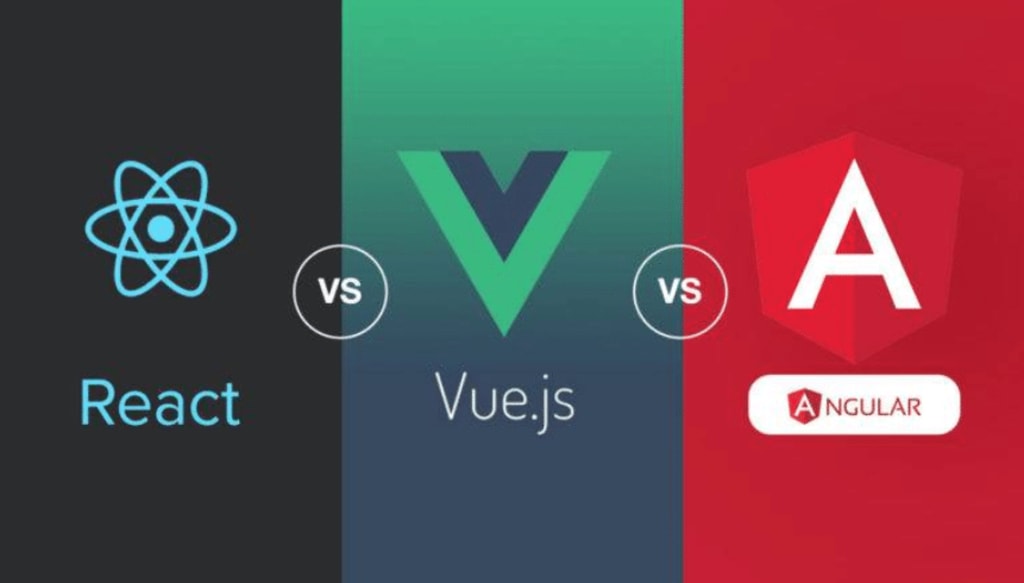
*Original Links are attached at the end.
Introduction
When it comes to choosing amongst chocolate, caramel, and red velvet, it’s literally a tough decision to make. But I know that when I am sad, chocolate works right for me, or when I am confused, caramel brings me some clarity, and red velvet is when I am sharing it with no one! Well, that doesn’t make either one of these better than the others. It is only about what works when, for me. In the same way, there is no right answer to “Which is the best JavaScript framework amongst- React, Angular, and Vue?” To answer all the commons questions that I come across on Google, like, “Is Vue faster than react?” Angular vs. React vs. Vue: Which framework to choose in 2020? or Angular vs. React vs. Vue: What is the best front-end JavaScript framework? Well, in either of the cases, I am going to lay a clear picture in front of you. As such, there is not any good, better, or the best front-end framework. It all depends on what type of web application you want to build, considering your business policies. To make it easier for you, I have categorized various aspects that one considers before choosing a front-end for development. Contact for ReactJS App Development
Top 6 Things to Consider Before Choosing a front-end Framework
Here are the 6 things to consider before choosing a front-end Javascript framework:
- Popularity
- Performance
- Community Support
- Library/Framework Size
- Learning Curve
- Flexibility
In this blog, I have depicted, compared, and described each of these aspects for React, Angular, and Vue. I hope after reading this comprehensive visual comparison on Angular Vs. Vue Vs. React, you will be able to choose the right framework for you. Primarily, let’s begin with an introduction to these front-end frameworks.
Angular
An open-source JavaScript framework that enables building robust and scalable Web applications on the go. Angular is the Google product and holds tremendous popularity when it comes to front-end app development. Google, WhatsApp, Forbes, and other top 500 companies all use angular as their Web development framework. AngularJS, or just angular, was launched back in 2010. The framework supported an array of features however the need to stay abreast with the current industrial trends mandated the angular team to embed modifications and then updated version in 2016 as Angular 2. Since then there have been several updates and newer releases. Also Read: Everything You Need to Know About Angular in Under 2 Minutes – Infographic The recent version of angular, Angular 8, supports a plethora of features that are proven to enhance the productivity of the developed application.
Unique Features of Angular
Compartmentalized
Building applications with angular is pretty easy. The fact that the framework breaks the app into multiple components, developers have the ease to work on each component separately. Having said that, angular has distinct files for the design part and the main logic part. Working on components streamlines the entire process of development and deployment.
Dependency Injection
Angular is not just about individual components or elements; dependency injection is another feature that sets the framework apart from the other two. This, in a way, leads to configurable dependencies. Meaning that in case you have dependent applications or components, developers need not indulge in the manual creation of the dependent object; instead, the angular injector creates and further injects the same within the code, taking the help of service providers.
High Modularity
Angular follows MVC architecture and further involves different components for separate tasks. Each module can be installed as and when needed, eliminating the installation of basic ones.
Pros & Cons of Angular
Pros:
- Enhanced design architecture
- MVC implementation
- Dependency Injection
- Typescript
Cons:
- Verbose & complex
- Steep learning curve
- Documentation not up-to-the-mark
React
With functional programming and a methodical Reactive approach, React hit the entire development world by storm, and it wasn’t of many surprises that the framework gained tremendous popularity in a shorter span of time. The framework was new and introduced an array of concepts that had to be learned prior to working on React. Unidirectional data flow, JSX, and component-based architecture React welcomed unique concepts to optimize the process of development and also enhance the productivity of the developed application. Unlike Angular, React has both HTML markup and business logic in the same single component. Additionally, React supports in-component communication through JS libraries or flux. So, if you are confused about React js vs Angular, go through these features of React. You might like to read: Why is React.js an Ideal Fit for IoT Applications?
Unique Features of React
State & Props
A distinct concept you will find only in React, state and props are objects that allow passing data/information from one component to a layout (this makes use of the state object) or sharing data between the parent and the child component (this makes use of the props object).
Greater Flexibility
React is bestowed with an array of tools that allow developers to add another layer of flexibility within the developed applications. Also, React has a plethora of libraries that ease the development process, speeding up the same.
Pros & Cons of React
Pros:
- Reusable components
- Performance enhancements
- Easy to learn and use
- SEO-friendly
Cons:
- Poor documentation
- JSX is a barrier
- Only versed with the view & no other tools
Vue
Again a Google product and the youngest of all, Vue looks like it is the merger of the two stated above. Adopting the state and props feature of React and the HTML-JavaScript combined layouts of angular, Vue has been ranked as one of the fastest-growing languages in the world of JavaScript. Alibaba, Gitlab, and Baidu are a few of the real-time Web applications built using Vue. To get your answers for Who wins the battle between React vs Vue and Vue vs Angular? Read ahead.
Unique Features of Vue
Vuex Library
Working on large-scale applications accounts for more significant complexities and needs to be dealt with sheer concern. Though React is also suitable for such kinds of applications, the fact that React uses Redux, which, in the long term, has more considerable drawbacks, vuex library seems to be a better fit. Used as flux like a state management tool, Vue offers greater ease to develop large-scale applications.
Steeper Learning Curve
As compared to angular (TypeScript) and React (JSX), Vue does not necessitate the need to develop another language or hold expertise in anything apart from JavaScript. So, now we have gone through the different frameworks along with the features that help them stand out in the crowd. It’s time that we draft a comparison between the three. By now, we saw one-to-one battles between Vue vs React, React js vs Angular, and Vue vs Angular. Now, let us see who is the winner of all when comparing the three altogether.
Pros & Cons of Vue
Pros:
- Lightweight
- Virtual DOM-performance
- Two-way data binding
- Readability
Cons:
- Language barrier
- Reactivity complexity
- Over Flexibility
- Limited resoruces
Comparing: Vue Vs React Vs Angular
React vs. Angular vs. Vue.js by Popularity
The UI frameworks and Javascript libraries work on a rollback. Their rankings, demand, and positions frequently change as new ones keep popping. React, Angular, and Vue are the most popular for the past few years. According to Google Trends, React is more popular, next leads Angular, followed by Vue. Whereas, as per the StackOverflow report, React attains the same first position, but Vue immediately goes after React, and Angular remains far behind.
React vs. Angular vs. Vue.js by Performance
The Document Object Model (DOM) determines the user interface of your application. Every javascript framework uses the DOM differently to set up the UI of a particular app. This DOM is generally quite deep owing to the nodes/elements attached to it, and it determines an app’s performance. Frameworks like React, use virtual DOM, which is an abstraction of the real DOM. The abstraction makes the DOM browser-specific. Hence, React and Vue, working on the virtual DOM, ensures faster app performance as compared to Angular that uses the real DOM.
React vs Angular vs Vue.js by Community Support
React was developed by Facebook to maintain and support its ad campaigns and coding, and a team of engineers is continually working on it, even currently. React is used in several products of Facebook, which shows a high investment of the company on the framework. This hit makes React very reliable in the developer community. Angular was introduced in the market by the leader- Google, using it mostly in Google AdWords applications. This conduct makes Angular authentic for the people to use and also provides strong community support. Vue, on the other hand, is not backed up by big names like Facebook or Google. Also, it is comparatively new in the market. But still, it has attained astounding popularity in the open-source community.
Concluding Comparison:
Based on performance, popularity, learning curve, flexibility, and community support, what we find is this,
React, and Vue offers better flexibility and performance than Angular.
Lightweight applications should choose to React or Vue, whereas Angular is best for large UI apps.
React and Vue is flexible as they allow to opt programmer’s choice tools, whereas Angular provides everything being opinionated.
The most popular and growing Javascript framework is Vue.
I hope your purpose of landing on this blog post is served, and you are able to choose the best suitable JavaScript framework/library for your web application. Depending on your specific requirements, you can hire dedicated front-end developer from us to gain the most out of our JavaScript to achieve your business goals.
Originally Posted by Bacancy
About the Creator
Subin
Subin is currently working as a Business Development Executive at CronJ IT Technologies, Bangalore. He has more than 2 years of experience in both Content Management and Business Development. He also loves to write tech related articles.






Comments
There are no comments for this story
Be the first to respond and start the conversation.